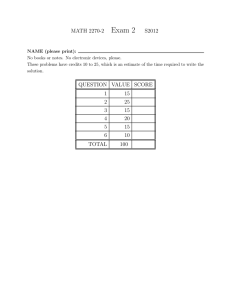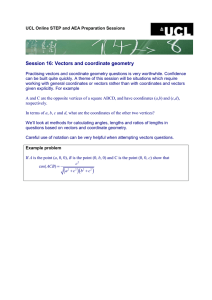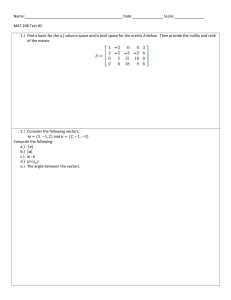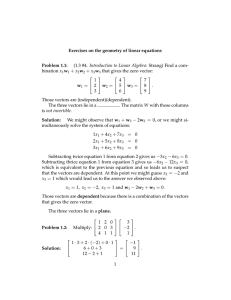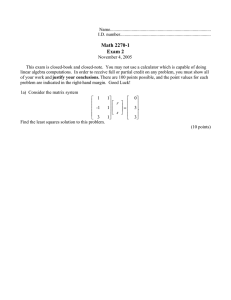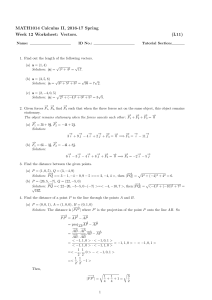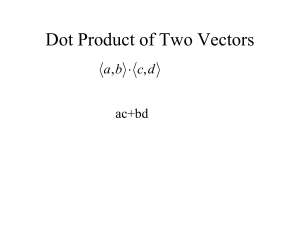MATH 2270-2 NAM E FINAL EXAM-F11 Do not write below this line!
advertisement
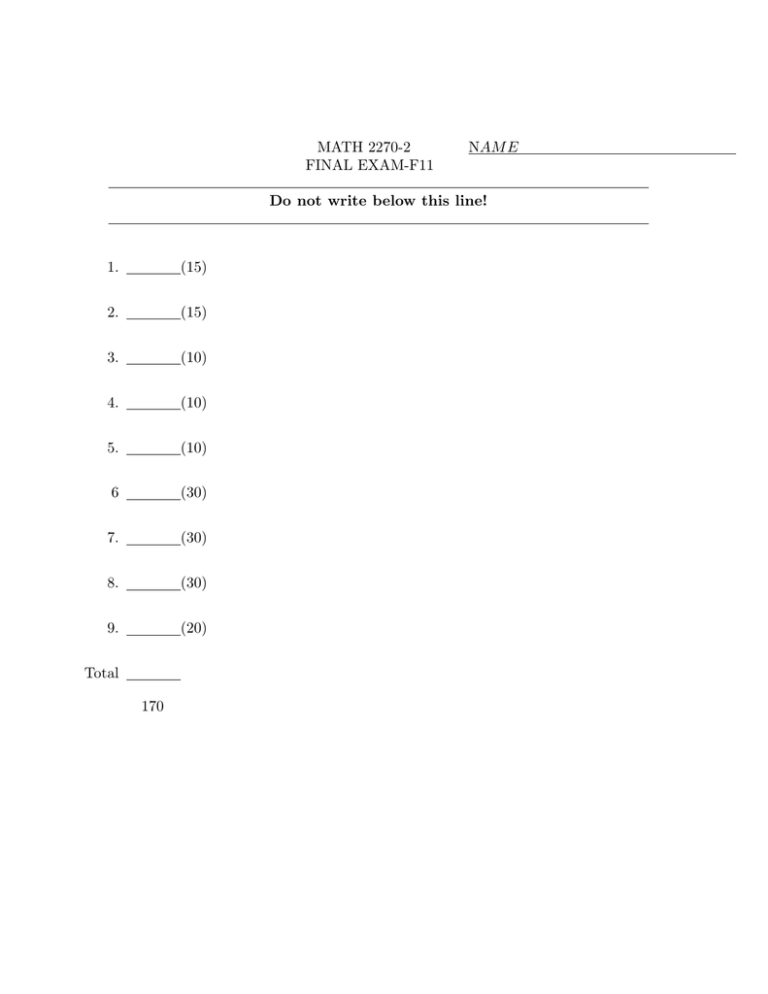
MATH 2270-2
FINAL EXAM-F11
NAM E
Do not write below this line!
1.
(15)
2.
(15)
3.
(10)
4.
(10)
5.
(10)
6
(30)
7.
(30)
8.
(30)
9.
(20)
Total
170
2
1. Let A ∈ Mm×n . Answer questions a, b, c (below) for this A.
(5) a. Can the rank of A be k where m < k < n? Explain.
(5) b. If n < m and rk(A) = n does AX = Y always have a solution for all Y ∈ Rm ?
Explain.
(5) c. If m < n does AX = 0 have a unique solution? Exlpain.
1
2. Let A be row equivalent to 0
0
2
0
0
(10) a. Find a basis for the null space of A.
(5) c. Find a basis for the row space of A.
1
1
0
0
0 . Solve a, and b (below) for this A.
0
3
(10) 3. If {(1, −1, 1), (0, 1, 1)} is a basis for N(AT ) where A ∈ M3×2 then find a basis
for Col(A).
3
(10) 4. Let L be the
thru the origin and having direction vector
√ line in R passing
3
(1/2, 1/2, 1/ 2), and T : R 7→ R3 be the linear transformation T (X) =
X−ProjL (X). What is the image (= {Y ∈ R3 | Y = T (X) for some X ∈ R3 })
of T ? Draw a picture!
4
1 −1
0
(10) 5. Let A =
. Show that σ = 1 is a singular value of A by finding
0
1 −1
V ∈ R3 , U ∈ R2 of length one such that AV = U.
5
6. Let B = {X1 , X2 , X3 } be a basis for R3 where X1 = (1, 1, 1), X2 = (0, 1, 1), and
X3 = (0, 0, 1). Solve a, b, and c (below) for this basis.
(10) a. Find the coordinates of (3, 1, 7) relative to the basis B.
1
(10) b. If [A]B = 0
1
−1 0
0 1 and [X]B = (1, 1, 1) then find AX.
1 1
(10) c. If T (X) = (x1 + x2 , x2 + x3 , x1 + x3 ) with X = (x1 , x2 , x3 ) then find [T ]B .
6
7. The Gram-Schmidt process applied to the vectors X1 = (1, 1, 1, 1) and X2 =
1
1
(1, 9, 9, 1) gives an orthonormal pair U1 = (1, 1, 1, 1), U2 = (−1, 1, 1, −1).
2
2
Solve a, b, c (below) for these vectors.
|
|
(10) a. Find the QR factorization for the matrix A = X1 X2
|
|
(10) b. Find the matrix of ProjV where V =span(X1 , X2 ).
x
(10) c. Find the least squares solution to AX = Y where A is as in part (a), X =
,
y
1
2
and Y = .
3
4
7
1
8. Let A = 0
1
0
1
1
−1
1 . Solve a, b, and c (below) for this matrix.
1
(10) a. Find the characteristic polynomial for the matrix A.
(10) b. Find a basis for the eigenspace R3A (1).
(10) c. Is A diagonalizable? Explain.
8
(10) 9. Determine if the quadratic form q(x, y) = 6x2 + 4xy + 3y 2 is positive definite.
(10) a. Draw the curve q(x, y) = 1 where q(x, y) is as above, giving the coordinates of
vectors which lie along the principal axes.
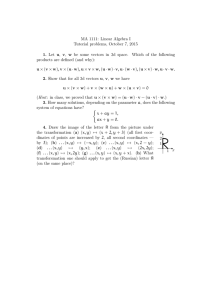
![= t1 [0, -1/3, 0, 1] (page cut off)](http://s2.studylib.net/store/data/011271865_1-e5f108751ec3c741c670be13242bd0fc-300x300.png)
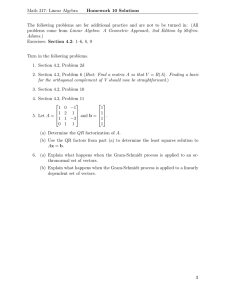

![MA1S11 (Timoney) Tutorial/Exercise sheet 1 [due Monday October 1, 2012] 1. 5](http://s2.studylib.net/store/data/010731543_1-3a439a738207ec78ae87153ce5a02deb-300x300.png)
